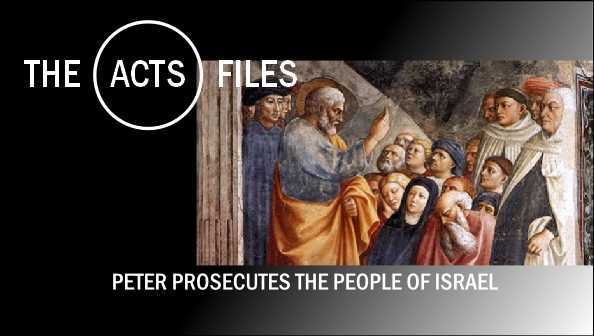By Tyson Thorne

I don’t know a single pastor – and I know a lot of pastors – who wouldn't love to have an object lesson like the one Peter and John have in Act’s chapter 3. Although I’m not sure many covet the way it ended…
Peter begins his sermon by giving credit where its due, clarifying that the miracle everyone just witnessed, the healing of a lame man, had nothing to do with them or their own godliness. Instead, he points to God, and he is very specific to mention it is not just their God, but the God of Israel. From this starting point he describes powerfully the means through which the miracle occurred, God’s Messiah, Jesus. In these 14 verses he uses 7 different names for Jesus including his proper name. Modern pastor/teachers would do well to talk about Jesus so enthusiastically.
When attending Moody Bible Institute I volunteered at a small church in downtown Chicago as a music director. The church was Saint John’s Apostolic Assyrian Church and the people were absolutely wonderful. They were mostly related and all immigrated or were born of immigrants from the same part of the world. One Sunday when driving to church with the pastor he confided in me that preaching was a little different at Saint John’s due to the congregation. There were some Old Testament passages he didn’t preach because, well, in much of the Bible the Assyrians are the bad guys. And they were, thousands of years ago, but the people of today are kind and a wonderful reflection of the hospitality of Jesus.
Unlike the pastor I worked with, Peter held nothing back. In his sermon he directly accuses the people of their sins. He states boldly that they rejected the Messiah and murdered him. He doesn’t stop there, however, and goes on to accuse the political and spiritual rulers of Israel of crimes against God. With complete certainty the Spirit of God was working in the hearts and minds of the crowd, for instead of being angered by the prosecutorial nature of the sermon, they were broken in spirit and repentant. At least most of them were, the ruling class that was present had hard hearts and were incensed by Peter’s teaching.
The careful reader will notice that Peter not once but throughout his brief sermon calls them to turn from their “sins” plural. It wasn’t only their rejection of the Messiah, it was all their sins. This is important to understand today as so many believe that they can repent of their rejection of Jesus and continue to live in the way they are accustomed to and comfortable with. Peter would speak against such theology vehemently! Coming to Christ is step one, living for Christ is the real challenge of faith. Every faith has an equal action, and to have faith in Christ means certain actions are inevitable. While we do not have to strive for perfection to gain God’s acceptance – he has already accepted us – we do need to strive to be holy and blameless. If you doubt this read Ephesians chapter one. For us to be holy and blameless is God’s will for our life.
Peter also shows a tremendous amount of knowledge of the Bible, at least the Bible that he had (the Old Testament). He uses that knowledge to prove to his Jewish audience that Jesus is the promised Messiah and worthy of their trust and acceptance.
One final thought: perhaps the impact of Peter’s sermon was due to its brevity. Something else modern pastors might want to consider. Next week we’ll examine the response to Peter’s homily.
|
|
|
